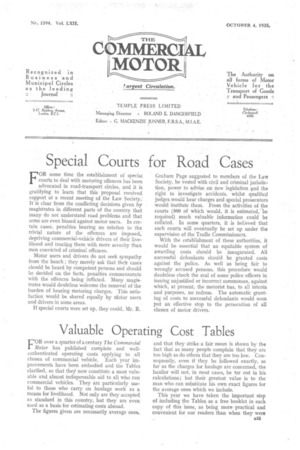Special Courts for Road Cases
Page 29

If you've noticed an error in this article please click here to report it so we can fix it.
FOR some time the establishment of special courts to deal with motoring offences has been advocated in road-transport circles, and it is gratifying to learn that this proposal received support at a recent meeting of the Law Society: It is clear from the conflicting decisions given by magistrates in different parts of the country that many do not understand road problems and that some are even biased against motor users. In certain cases, penalties bearing no relation to the trivial nature of the offences are imposed,' depriving commercial-vehicle drivers of their livelihood and treating them with more severity than men convicted of criminal offences.
Motor users and drivers do not seek sympathy from the bench ; they merely ask that the cases should be heard by competent persons and should be decided on the facts, penalties commensurate with the offences being inflicted. Many magistrates would doubtless welcome the removal of the burden of hearing motoring charges. This satisfaction would be shared equally by nlotor users and drivers in some areas.
If special courts were set up, they could, Mr. R. Graham Page suggested to members of the Law Society, be vested with civil and criminal jurisdiction, power to advise on new legislation 4nd the right to investigate accidents, whilst qualified judges-would hear charges and special prosecutors would institute them. From the activities of the courts (500 of which would, it is estimated, 'be required) much valuable information could be collated. In some quarters, it is bel:eved that such courts will eventually be set up under the supervision of the Traffic Commissioners.
With the establishment of these authorities, it would be essential that an equitable system of awarding costs should be inaugurated. All successful defendants should be granted costs against the police. As well as being fair to wrongly accused persons, this procedure would doubtless check the zeal of some police officers in issuing unjustified or incorrect summonses, against which, at present, the motorist has, to all intents and purposes, no redress. The automatic granting of costs to successful defendants would soon put an effective stop to the persecution of all classes of motor drivers.




























































































